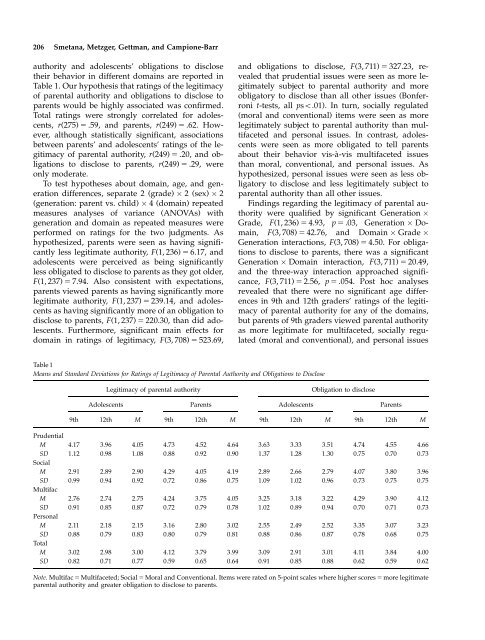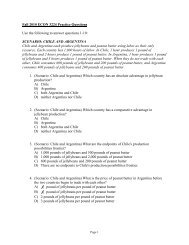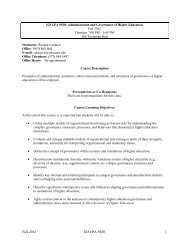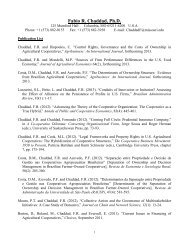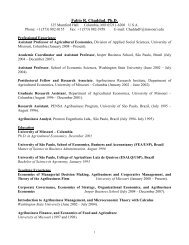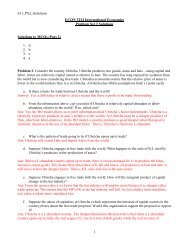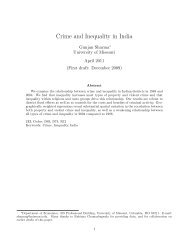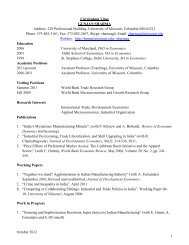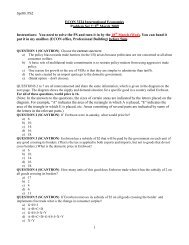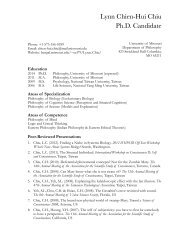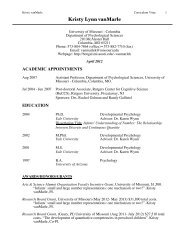Disclosure and Secrecy in Adolescent–Parent Relationships
Disclosure and Secrecy in Adolescent–Parent Relationships
Disclosure and Secrecy in Adolescent–Parent Relationships
You also want an ePaper? Increase the reach of your titles
YUMPU automatically turns print PDFs into web optimized ePapers that Google loves.
206 Smetana, Metzger, Gettman, <strong>and</strong> Campione-Barr<br />
authority <strong>and</strong> adolescents’ obligations to disclose<br />
their behavior <strong>in</strong> different doma<strong>in</strong>s are reported <strong>in</strong><br />
Table 1. Our hypothesis that rat<strong>in</strong>gs of the legitimacy<br />
of parental authority <strong>and</strong> obligations to disclose to<br />
parents would be highly associated was confirmed.<br />
Total rat<strong>in</strong>gs were strongly correlated for adolescents,<br />
r(275) 5 .59, <strong>and</strong> parents, r(249) 5 .62. However,<br />
although statistically significant, associations<br />
between parents’ <strong>and</strong> adolescents’ rat<strong>in</strong>gs of the legitimacy<br />
of parental authority, r(249) 5 .20, <strong>and</strong> obligations<br />
to disclose to parents, r(249) 5 .29, were<br />
only moderate.<br />
To test hypotheses about doma<strong>in</strong>, age, <strong>and</strong> generation<br />
differences, separate 2 (grade) 2 (sex) 2<br />
(generation: parent vs. child) 4 (doma<strong>in</strong>) repeated<br />
measures analyses of variance (ANOVAs) with<br />
generation <strong>and</strong> doma<strong>in</strong> as repeated measures were<br />
performed on rat<strong>in</strong>gs for the two judgments. As<br />
hypothesized, parents were seen as hav<strong>in</strong>g significantly<br />
less legitimate authority, F(1, 236) 5 6.17, <strong>and</strong><br />
adolescents were perceived as be<strong>in</strong>g significantly<br />
less obligated to disclose to parents as they got older,<br />
F(1, 237) 5 7.94. Also consistent with expectations,<br />
parents viewed parents as hav<strong>in</strong>g significantly more<br />
legitimate authority, F(1, 237) 5 239.14, <strong>and</strong> adolescents<br />
as hav<strong>in</strong>g significantly more of an obligation to<br />
disclose to parents, F(1, 237) 5 220.30, than did adolescents.<br />
Furthermore, significant ma<strong>in</strong> effects for<br />
doma<strong>in</strong> <strong>in</strong> rat<strong>in</strong>gs of legitimacy, F(3, 708) 5 523.69,<br />
Table 1<br />
Means <strong>and</strong> St<strong>and</strong>ard Deviations for Rat<strong>in</strong>gs of Legitimacy of Parental Authority <strong>and</strong> Obligations to Disclose<br />
<strong>and</strong> obligations to disclose, F(3, 711) 5 327.23, revealed<br />
that prudential issues were seen as more legitimately<br />
subject to parental authority <strong>and</strong> more<br />
obligatory to disclose than all other issues (Bonferroni<br />
t-tests, all pso.01). In turn, socially regulated<br />
(moral <strong>and</strong> conventional) items were seen as more<br />
legitimately subject to parental authority than multifaceted<br />
<strong>and</strong> personal issues. In contrast, adolescents<br />
were seen as more obligated to tell parents<br />
about their behavior vis-à-vis multifaceted issues<br />
than moral, conventional, <strong>and</strong> personal issues. As<br />
hypothesized, personal issues were seen as less obligatory<br />
to disclose <strong>and</strong> less legitimately subject to<br />
parental authority than all other issues.<br />
F<strong>in</strong>d<strong>in</strong>gs regard<strong>in</strong>g the legitimacy of parental authority<br />
were qualified by significant Generation<br />
Grade, F(1, 236) 5 4.93, p 5 .03, Generation Doma<strong>in</strong>,<br />
F(3, 708) 5 42.76, <strong>and</strong> Doma<strong>in</strong> Grade<br />
Generation <strong>in</strong>teractions, F(3, 708) 5 4.50. For obligations<br />
to disclose to parents, there was a significant<br />
Generation Doma<strong>in</strong> <strong>in</strong>teraction, F(3, 711) 5 20.49,<br />
<strong>and</strong> the three-way <strong>in</strong>teraction approached significance,<br />
F(3, 711) 5 2.56, p 5 .054. Post hoc analyses<br />
revealed that there were no significant age differences<br />
<strong>in</strong> 9th <strong>and</strong> 12th graders’ rat<strong>in</strong>gs of the legitimacy<br />
of parental authority for any of the doma<strong>in</strong>s,<br />
but parents of 9th graders viewed parental authority<br />
as more legitimate for multifaceted, socially regulated<br />
(moral <strong>and</strong> conventional), <strong>and</strong> personal issues<br />
Legitimacy of parental authority Obligation to disclose<br />
Adolescents Parents Adolescents Parents<br />
9th 12th M 9th 12th M 9th 12th M 9th 12th M<br />
Prudential<br />
M 4.17 3.96 4.05 4.73 4.52 4.64 3.63 3.33 3.51 4.74 4.55 4.66<br />
SD 1.12 0.98 1.08 0.88 0.92 0.90 1.37 1.28 1.30 0.75 0.70 0.73<br />
Social<br />
M 2.91 2.89 2.90 4.29 4.05 4.19 2.89 2.66 2.79 4.07 3.80 3.96<br />
SD 0.99 0.94 0.92 0.72 0.86 0.75 1.09 1.02 0.96 0.73 0.75 0.75<br />
Multifac<br />
M 2.76 2.74 2.75 4.24 3.75 4.05 3.25 3.18 3.22 4.29 3.90 4.12<br />
SD 0.91 0.85 0.87 0.72 0.79 0.78 1.02 0.89 0.94 0.70 0.71 0.73<br />
Personal<br />
M 2.11 2.18 2.15 3.16 2.80 3.02 2.55 2.49 2.52 3.35 3.07 3.23<br />
SD 0.88 0.79 0.83 0.80 0.79 0.81 0.88 0.86 0.87 0.78 0.68 0.75<br />
Total<br />
M 3.02 2.98 3.00 4.12 3.79 3.99 3.09 2.91 3.01 4.11 3.84 4.00<br />
SD 0.82 0.71 0.77 0.59 0.65 0.64 0.91 0.85 0.88 0.62 0.59 0.62<br />
Note. Multifac 5 Multifaceted; Social 5 Moral <strong>and</strong> Conventional. Items were rated on 5-po<strong>in</strong>t scales where higher scores 5 more legitimate<br />
parental authority <strong>and</strong> greater obligation to disclose to parents.


